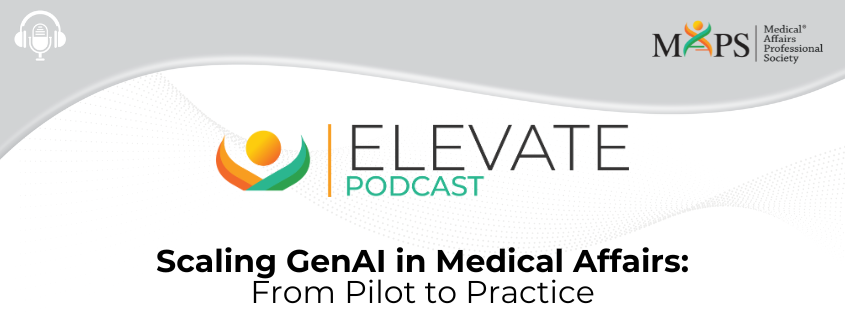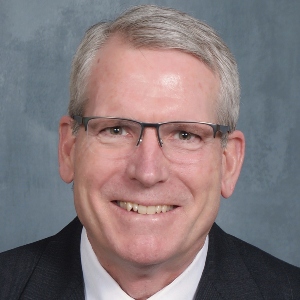From chatbots and content generation to insights mining and decision support, GenAI is moving from buzzword to backbone. In this “Elevate” episode, our hosts Jennifer Riggins & Steve Casey speak to a panel of experts on the frontlines of GenAI implementation to share their hard-won insights.
Speaker: Jennifer Riggins
Speaker: Steve Casey
Speaker: Vandana Grover
Speaker: Bora Erdemli
Speaker: Jenny Ghith
Following is an automated transcription provided by otter.ai. Please excuse inaccuracies.
00;00;00;00
MAPS
Oh. Welcome to this episode of the Medical Affairs Professional Society podcast “Elevate”. The views expressed in this recording are those of the individuals, and do not necessarily reflect on the opinions of MAPS or the companies with which they are affiliated. This presentation is for informational purposes only and is not intended as legal or regulatory advice. And now for today’s “Elevate” episode.
00;00;33;09
Jennifer Riggins
Welcome to Elevate the Medical Affairs Professional Society podcast. We have a series within this podcast that’s called Digital First Communications. How digital is transforming Medical Affairs. I’m Jennifer Riggins, your co-host for today’s episode.
00;00;49;10
Steve Casey
And I’m Steve Casey. Today, we’re diving into one of the most exciting and complex topics shaping the future of pharma. Scaling generative AI and Medical Affairs. From chat bots and content generation to insights mining and decision support, Gen AI is moving from buzzword to backbone.
00;01;07;00
Jennifer Riggins
Well, let’s go ahead and jump right in. We’re joined today by three industry leaders Vandana Grover, Senior Director of Digital Strategy and Innovation from Eisai, Bora Erdemli, Partner, Head of EU Medical Affairs from ZS Associates, and Jenny Ghith, Senior Director, Channel Integration and Innovation Lead, Global Scientific Communications at GSK. They’ve been on the frontlines of gen AI implementation and are here to share their hard won insights. These three Medical Affairs AI experts held a standing room only workshop at the 2025 MAPS Americas meeting in New Orleans in March. Following that great excitement, there is still so much that we have to learn from them.
00;01;52;28
Steve Casey
We’re now. Several months later, AI is still heading the news. And there are continues to be a lot of excitement surrounding AI. But it seems we’re now in a different part of the cycle with that AI. Where the rubber is hitting the road, so to speak. We’re getting to work and understanding its strengths and limitations. There’s a Gartner cycle that is used here to describe tech innovation, and it feels like we might. Be moving into the, quote, trough of disillusionment, unquote. Things are getting hard. Budgets are getting tight. But the momentum seems to be there. Vandana, your MAPS 2025 session, you called this a moment. An inflection point for gen AI. And in pharma. Why is now the tipping point for adoption?
00;02;36;22
Vandana Grover
So great question. So for years, I think few moved past experimentation. We saw. I used in isolated pilots things like tools to automate literature reviews or answer basic medical queries. But we’re now seeing convergence, better models, more compute power like larger context windows and LMS, and a real hunger from internal stakeholders for faster, more relevant insights and a need for improved efficiencies. And now, with more regulatory openness and increasing HCP expectations, you really get this perfect storm for scale.
00;03;13;29
Jennifer Riggins
For your role at GHS involves helping companies turn interest into implementation. How do you help them move from exploration to execution?
00;03;24;21
Bora Erdemli
Great question. Jennifer. So we often meet teams when excitement is high, but the direction is unclear. The shift from exploration to execution happens when they stop treating Genii as a tool. And start thinking of it as an operating model. Transformation. So for Medical Affairs, this means reimagining how evidence is generated, how insights are activated, and how field teams engage. So we begin with strategic alignment. What business outcomes are driving? We are driving and then co-design workflows that embed gen AI into daily decisions. The best implementations don’t just automate. They elevate the role of medical.
00;04;11;26
Steve Casey
Jenny. You’ve been a leading advocate for AI adoption. Have you seen the expectations around change evolve? Especially within global scientific communications?
00;04;21;20
Jenny Ghith
It’s really continuing to evolve very quickly. I do think we’re maturing a bit in how we think about use cases. We’re starting to think about scale and integration even more. Initially, there is this sort of caution and curiosity. Many, many of us and many of the companies we work for are at the pilot stages. We run proof of concepts. And this is, this was really reflected in many of the comments from the attendees in the sessions. There’s a there’s a just a greater sense of, of urgency now, a desire for pull through. And as we talked it through with the workshop groups, there were also questions in key areas, in particular. Again, I think there’s more comfort in using AI with some basic things. So meeting notes, and summaries, some basic slide text. But there is a understanding that there is more of a need for integration and hopefully really an understanding of more of what that means.
00;05;24;16
Jennifer Riggins
So I’ve definitely seen that greater sense of urgency in colleagues that I’d been working with. Can you tell me more about what you’re hearing regarding these additional questions that you talked about in key areas?
00;05;36;13
Jenny Ghith
Yeah. They have questions like how do we navigate compliance security considerations? What are what are you doing to drive transparency in the use of AI? I think the copyright space continues to evolve very quickly. And there are a lot of questions around that. And, you know, some barriers and differences of opinion around copyright as well. Particularly around ingestion of content by systems. So that was a hot topic. There are more and more hearings on the docket on the courts, among companies and big players like anthropic and OpenAI. And I think trust is also a major issue that remains. We really need better understanding of the accuracy of these systems. And hallucinations, beyond what is being provided in benchmarks like beating medical license examinations. Are these content pieces good enough for first drafts? What does that mean? We need to also be transparent in our evaluations, in the sharing of how we’re running our value evaluations. There aren’t standards for that either, right now. And that will help all of us understand more, as many of us who are starting to pilot use cases that can be, similar across purposes. Finally, I think we’re starting to think about cognitive load. You know, how much brainpower you’re dedicating, to your activities and how that changes when you’re running them with in partnership with AI? Does it decrease with the use of these systems? Do we lose our own abilities, or are we less mindful or watchful of what we are delivering? Because ultimately we’re still responsible and accountable for what we deliver? I’ve thought about that a lot since New Orleans. I think that while we’re discussing scaling and that was the main topic of the workshop, many of our questions still reflect us being at a pilots stage and an early stage.
00;07;35;06
Steve Casey
Some excellent points. You know, you guys, your MAPS. Session busted some popular myths about Gen. I, for instance, like the idea that only expert prompt engineers can use it or that cost savings are immediate. When done it. What mindsets need to. Continue to shift for scale?
00;07;53;21
Vandana Grover
And so people need to stop thinking of generative AI as purely an experiment. It’s already not only a workplace tool used in emails or in programs like Excel, where the goal is utility, but also a strategic partner that can help brainstorm, build medical strategy and plan more effectively, and even unlock creative thinking. I think encouraging teams to embed gen AI in daily workflows, whether that’s responding to HCP queries or personalizing medical content will help. I become a natural part of the day to day. And yes, we need training. But more importantly, we need confidence and trust.
00;08;37;11
Jennifer Riggins
Oh, I couldn’t agree with that. More. Bora, had you coached teams past their skepticism or pilot paralysis?
00;08;46;06
Bora Erdemli
Gen pilot pilots is usually hides a bigger issue. This is often the lack of belief that generative AI is core to have medical or people’s should operate. So what we do is that we help teams shift mindset from experimentation, experimentation to ownership. So this starts with tying gen. I use cases directly to the value levers or strategic objectives that they have. It could be accelerating content turnaround, improving decision confidence or enabling more personalized physician engagement. So we also coach leaders to build momentum to earn trust. Small wins that demonstrate reliability, not hype. Once the organizations see that gen AI is not a side project, but a better way to work, then things start to move much faster.
00;09;38;26
Steve Casey
Yeah. Jenny, what’s one mindset. Change you’ve seen that has made the biggest impact? And how AI is being piloted and scaled.
00;09;48;28
Jenny Ghith
So, I think that it’s as in transitioning to kind of a more experiment from an experiment based mindset into kind of an integrated mindset. What else comes to mind is empowering collaboration. So we need to more than ever, work hand-in-hand with our digital colleagues. So the digital college colleague work and the subject matter expert work is really key. We have different frames of reference. We use different terms and different lexicons. And our teams do get siloed in our work. And we risk accumulating things like tech debt with tools that we that don’t really support the needs of the subject matter experts. Tokenization, for example, does, you know, take take funds and resources and time and to figure out. So in contrast, we could also miss out on new ways of working because we figured out what works for us on a day to day basis. And that gets us by. So we don’t tend to engage with the tools as much. So there’s a lot of really great research coming out to, studies from institutions like Stanford and MIT that support the rise of these inbetweeners. These folks who can help drive connections across teams. And I think Medical Affairs is really uniquely positioned to do that.
00;11;14;16
Jennifer Riggins
Ooh, I like that. I like that term. The rise of inbetweeners. Who can drive connections across teams. That’s really what Medical Affairs is. All about. Bridging the teams.
00;11;25;15
Steve Casey
So let’s switch gears. A little bit here. Want to get more into the capabilities in use cases. And download your MAPS 2020. Five presentation. Showcase dozens of gen AI enabled capabilities, everything from drafting SSDs to mining real world data. Where are you seeing the most momentum?
00;11;44;22
Vandana Grover
So content transformation is a big one. With modular content models we can generate, review and reuse medical content faster than ever. There’s also a strong uptake in analytics Copilot tools that surface insights from unstructured data or social listening platforms. The key is really aligning these tools with unmet business needs.
00;12;07;14
Jennifer Riggins
Yeah. That’s definitely the key. Bora, how do you help clients navigate the risk spectrum? Those questions that Jenny was talking about earlier. Especially when tools are dealing with sensitive data.
00;12;20;12
Bora Erdemli
That’s a great question. So often we guide clients through a layered approach to responsible scaling. As Vandana just talked about, it, it starts with use case selection. Some of the teams like focusing on summarizing Congress insights or streamlining internal Q&A. So there are really carry low risk but high return and others, other teams like applying generative AI to create scientific content generation that demands really rigorous safeguards. So what we believe that our role is to help, Medical Affairs organizations to balance ambition with guardrails. So ensuring that governance, transparency and auditability are built in from the start. We are moving, from essentially the other change that we are hoping to create is to moving from compliance first mindset to one of intelligent risk taking. We believe that that’s how innovation becomes sustainable in the area of AI.
00;13;22;27
Steve Casey
Jenny, how is Gen AI supporting content creation and personalization efforts.
00;13;27;23
Jenny Ghith
I agree with Vandana. I think it’s a big opportunity. I think the workshop really reinforced it. It helps us adapt content for those channels and audiences. You know, we’re not thinking about one deliverable at a time or one tactic or one piece of content. We can actually consider how we develop pieces in tandem, and more quickly. We’ve we’ve been thinking too small, piece by piece because of our own bandwidth. It’s also important to consider that we’re, we’re living in a world where there are lots of ways our audiences are receiving information and getting reached out to with the content that we develop. So how do we also ensure that we’re driving the right content? It’s not all quality or all quantity. It’s quality as well, right? So share voice is something that we talk about more. Relevance and finding materials becomes even more critical and enabling ways to do that. And on the tech side, we talk about chain of thought and reasoning capabilities, and how those sorts of, capabilities from AI systems can help us to, develop better content and overcome information overload that we get when we’re consuming this content. These are really things that I think we’re going to hear more about in the news and more, information will emerge from the tech experts, as we get further out from MAPS and we start to think about the next events. I do again think about relevance more. How are we getting fed this information? What choices is the AI making that we aren’t even aware of to put pieces of content in front of us? I think a lot about the persuasive abilities of these systems to and, and how we need more research in that area and how it’s impacting health care. And what about differences, in information pieces, the potential for misinformation in the content we developed. How do we judge how likely we are to receive what we need? That it’s correct. And are the algorithms pushing us more towards polarization and tribal ization and reinforcing the beliefs we already have? And then, of course, misinformation. There’s recently been some discussion about how pieces of text are being inserted as white text or small text that the AI algorithms can read themselves. And you can imagine when these pieces of text get inserted into scientific articles, that direct reviewers or that make articles more searchable. Those things affect what reaches us, and even how content can be reviewed. If we’re using AI systems to review our own content.
00;16;23;22
Jennifer Riggins
Wow. That’s kind of crazy. These are all really great points, Jenny. I’m often very leery about, my AI results, you know, due to these same reasons. Relevance, AI persuasion, reused misinformation. It’s really something that we have to continue to be very critical about and critical in our evaluation.
00;16;44;04
Steve Casey
Yeah, and I think we could probably do a number of different, podcasts just talking about what you just went through, Jenny. But for today, let’s, switch a little bit and talk. About, the strategy to Shark Tank. Let’s talk about that Shark Tank exercise from MAPS 2025. Vandana. What was the goal?
00;17;02;21
Vandana Grover
So we really wanted to simulate a real world scenario. Pitching a generative AI idea to a skeptical internal audience. Teams were asked to scale a use case, build a strategy, anticipate resistance, and frame success metrics. The goal was about moving from theoretical to tactical. However, because of where most of us were on our journeys, we ended up focusing more on the use cases themselves. So more work is needed before we get to scale. But teams are building strong foundations.
00;17;36;27
Jennifer Riggins
I really love this shark tank exercise. Bora, can you tell us about any standout pitches you had or conversations or learnings from the Shark Tank exercise?
00;17;46;17
Bora Erdemli
Absolutely. Overall, like, what stood out to me wasn’t the ideas around the technology or have sophisticated take, you know, it the ideas where it was, the shift in the narrative a few really good teams didn’t really just talk about a generative AI tool or a use case, but they pitched the business case for changing how they create value or how they work differently. For example, one team proposed a gen AI powered insight engine. But not just to identify the insights, but to think about how to incorporate it into their key decision making processes, like portfolio strategy. Another team talked about, medical legal review process, using generative AI to cut review cycles while improving consistency. So what made these ideas powerful to me was that they did not chase novelty. They actually were trying to solve real problems that they tried to solve every day, but they care about.
00;18;48;10
Steve Casey
Jenny. If you were a workshop participant instead of a leader at that workshop, what would. Your pitch have been?
00;18;54;08
Jenny Ghith
Steve, I think it’s a great question. If I were sitting in the room, I think I would have really tried to present a case that dealt with, the persuasive component, and tried to help a content developer reason through how to get better at content development. And ask them questions along the way to help them, think through how to present. Like, I would love to have seen like a critic agent, for example, come through in the use cases. What I also would have done is I would have stressed the collaborative nature of the work and the partnership between the digital teams and the SMEs. So I’m really with, with more I think, the best pitches were really the ones where the teams came together and told us stories. And I just, I also would say I think everyone really embraced the, the components of the pitch in the sessions. They really were able to tell us stories about the the reason behind the use case and the value that they were trying to work towards. And I think that’s really important and an evolution of how we’re all thinking. We need to be able to articulate to our leaders what’s in it for them. Beyond just the excitement in the tech.
00;20;13;13
Steve Casey
Well, that’s really good stuff. I, I think it’s been very interesting to learn. It was great to see. And very interesting to learn about how you view those, Shark tank, case studies. And I really think, using that, having a pipeline of use cases, not only from what you folks were talking about earlier in the podcast, but also from like Shark Tank. And it shows that there’s little to no gap in learning and experimentation that’s going on.
00;20;44;02
Jennifer Riggins
Okay, so we’ve got time for final thoughts and one more question. I think all of us on this podcast agree that generative AI will be the backbone of Medical Affairs. And I know that Steve and I personally think that Gen AI will increase the importance of Medical Affairs activities and the value of Medical Affairs within the organization far beyond where it sits today. We’ve been talking a great deal about key questions, different use cases moving from pilot to scaling in Med Affairs. But in a lot of cases, you know, we see companies that are not even ready to support medical piloting AI. So for for Medical Affairs professionals who find themselves in that kind of scenario, what would be your advice to them to prepare for the AI future or what do you do if you feel like you’re not ready at all? So, Vandana, let’s start with you.
00;21;41;03
Vandana Grover
So, don’t wait for perfect. Start small. Be strategic. Be deliberate and build momentum. Let your wins create pull. Determine if you need to buy, build, blend, or partner. Make adoption easier by starting with familiar tools and fuel innovation with a culture that’s curious, experimental, and most importantly, fun.
00;22;05;18
Bora Erdemli
Maybe if I jump in here and add a couple of thoughts. Jen, I think, you know, I agree with one that, first of all, you don’t need to have a perfect tech stack or perfect process to begin with. Just you need to start where you are, but start with intent. So what everyone needs is really clarity on how genii can amplify their mission, whether in the context of Medical Affairs. It is whether that’s accelerating evidence generation, scaling medical education, or simply freeing up your team’s time to focus on really higher value work. And most importantly, we need to build the case for generative AI as a way to elevate Medical Affairs into a more strategic, connected, and impactful function.
00;22;52;18
Jenny Ghith
I would say be inclusive. Bring diverse voices in early. And make sure everyone is heard and is part of the story. Than the cases that you’re building as you’re integrating and scaling. I think we’re all a little uncomfortable. So think about how to be practical, how to build a business case. Think about the impact for the company. And it’s not just the dollars and the sense. It’s quality of the outputs. Spead for, 30 days faster on a product and a release of data, or having materials get into the hands of the field is really meaningful. And prioritize, prioritize, prioritize, and understand that if you’re working with collaborators, particularly your agency partners, think about how to work with them to drive solutions together and understand their day to day so that you get get to a place where you’re transforming your workload and the pace at which you’re delivering.
00;24;01;16
Steve Casey
So, a huge thanks to Vandana Bora and Jenny. You shared a lot of great thoughts with us today. And to you, our audience, we hope today’s episode helps you move from curiosity to capability in your organizations. Until next time, stay curious and keep innovating.








